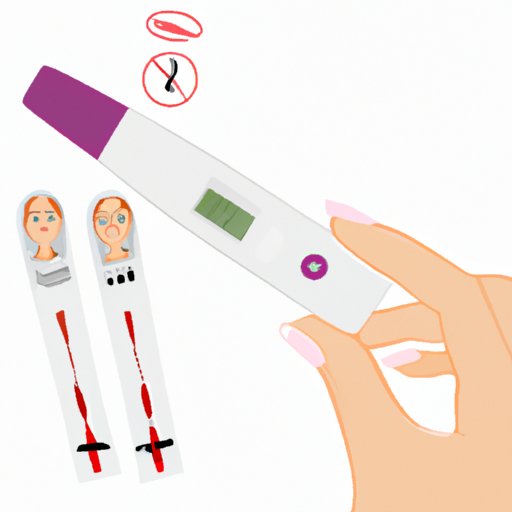
Introduction
Are you curious about how soon you can get a positive pregnancy test? Whether you’re trying to conceive or just unsure if you’re pregnant, waiting for an accurate answer can be nerve-wracking. This article will guide you through the science of early pregnancy testing, including how different types of tests work and when to expect accurate results. We’ll also explore common myths and misconceptions about pregnancy testing and provide coping strategies for the emotional challenges of waiting for results.
Patience is Key: Understanding the Accuracy of Pregnancy Tests and When to Expect a Positive Result
Pregnancy tests work by detecting the presence of human chorionic gonadotropin (hCG), a hormone produced by the placenta after a fertilized egg implants in the uterus. Different pregnancy tests have different levels of sensitivity to hCG, meaning that some tests can detect pregnancy earlier than others.
The most sensitive tests, typically described as having the lowest “threshold” for hCG detection, include blood tests and early result pregnancy tests. Blood tests can detect hCG as early as 7-12 days after ovulation, while early result home pregnancy tests claim to provide accurate results up to 6 days before a missed period. However, it’s important to note that false negative results are not uncommon when testing this early.
Other types of pregnancy tests, including traditional over-the-counter urine tests, may have a higher threshold for hCG detection and, as a result, will likely produce accurate results later in pregnancy. It is generally recommended to wait until after a missed period to take a pregnancy test for the most accurate result.
How Soon Can You Find Out You’re Expecting? A Guide to Early Pregnancy Testing
Early symptoms of pregnancy can include fatigue, nausea, breast tenderness, and spotting. However, these symptoms can be easily confused with premenstrual symptoms and are not always reliable indicators of pregnancy.
The earliest point at which pregnancy can be detected through testing is when the fertilized egg begins to implant in the uterus, typically about 6-12 days after ovulation. It is possible to take a pregnancy test as early as this point, but again, false negative results are common.
When taking a pregnancy test, it’s important to read and follow the instructions on the package carefully. Urinate directly onto the test strip or collect a urine sample in a clean cup and use the dropper provided to apply the urine to the test. Wait the recommended amount of time before reading the results, and be sure to discard the test if it has expired or if the packaging is damaged.
The Science of Pregnancy Testing: Exploring How Early You Can Detect Pregnancy
Pregnancy hormones, including hCG, change over time as pregnancy progresses. The level of hCG in the body typically doubles every 48-72 hours in early pregnancy, peaking at around 8-10 weeks before gradually decreasing.
As a result, the accuracy of pregnancy tests can also change over time. Testing too early may result in a false negative, as hCG levels may not yet be high enough to be detected. However, testing too late in pregnancy may produce a false positive, as hCG levels may have already peaked and begun to decrease.
There are a variety of pregnancy tests available, including traditional urine tests, digital tests, and early result tests. Early result tests claim to provide accurate results up to 6 days before a missed period, while digital tests typically have a higher threshold for hCG detection and may produce false negatives if testing too early.
Is it Too Early? Debunking Common Pregnancy Test Myths and Misconceptions
It’s common to hear myths and misconceptions about pregnancy testing, including ideas about what may impact the accuracy of results. Some people believe that drinking water or having a full bladder can affect the accuracy of a test, while others may think that taking multiple tests at once can increase the likelihood of a correct result.
In reality, these beliefs are largely unfounded. Drinking water or having a full bladder will not affect the accuracy of a pregnancy test, and taking multiple tests at once may actually cause confusion and hinder accurate interpretation of results. It’s important to always follow the instructions on the package and wait the recommended amount of time before reading the results.
Waiting to Know: Coping Strategies for the Emotional Journey of Early Pregnancy Testing
The wait for accurate pregnancy test results can be stressful and emotionally challenging. It’s common to feel a range of emotions, including anxiety, hopefulness, and fear.
To manage the stress of waiting for results, some strategies may include distraction techniques such as exercise or hobbies, self-care practices like meditation or journaling, and seeking support from loved ones or online communities. Remember that no matter the results of your pregnancy test, there is support available and resources to help you navigate this time.
Conclusion
Early pregnancy testing can be an exciting and nerve-wracking time. Understanding the science of pregnancy tests and remaining patient can help you get the most accurate results. Remember to always follow the instructions on the package, wait until after a missed period for the most reliable results, and seek support from loved ones or resources if needed.





